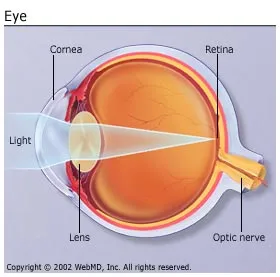Vision problems are relatively common in people with multiple sclerosis (MS); however, rarely do these problems result in total blindness.
What Type of Vision Problems Are Linked to Multiple Sclerosis?
Optic Neuritis
Optic neuritis is the inflammation of the optic nerve, the nerve that transmits light and visual images to the brain, and is responsible for vision.
According to the National Multiple Sclerosis Society, 55% of people with MS will have an episode of optic neuritis. Frequently, it’s the first symptom of the disease. Although having optic neuritis is very suggestive of MS, it does not mean that a person has or will get MS.

The symptoms of optic neuritis are the acute onset of any of the following:
- Blurred vision
- Graying of vision
- Blindness in one eye (usually)
It’s rare that both eyes are affected simultaneously. And pain is rare. Loss of vision tends to worsen over the course of a few days before getting better. This usually takes about four to 12 weeks. Treatment may include intravenous and/or oral steroids to control the inflammation.
Double vision occurs when the pair of muscles that control a particular eye movement are not coordinated due to weakness in one or more of the muscles. Although annoying, double vision usually resolves on its own without medical treatment.
Uncontrolled Eye Movements
Uncontrolled horizontal or vertical eye movements, called nystagmus, is another common symptom of MS. Nystagmus may be mild or it may be severe enough to impair vision. Some drugs and special prisms have been reported to be successful in treating the visual deficits caused by nystagmus.
Temporary Blindness
Temporary blindness in one eye may occur at the time of an acute exacerbation of MS. An exacerbation — also known as a flare — is a sudden worsening of a MS symptom or symptoms, or the appearance of new symptoms, which lasts at least 24 hours and is separated from a previous exacerbation by at least one month.
Temporary blindness is most often due to optic neuritis.
Article Source: WebMD
……..
To comment – click the comment link shown below
…….
USE OUR SHARE LINKS at the top of this page – to provide this
article to others
…….
USE OUR SHARE LINKS at the top of this page – to provide this
article to others
……
REMAIN up to date
with MS News and Education
with MS News and Education
Visit: www.msviewsandnews.org to register
…………………….
.
Visit our MS Learning Channel on YouTube: http://www.youtube.com/msviewsandnews


